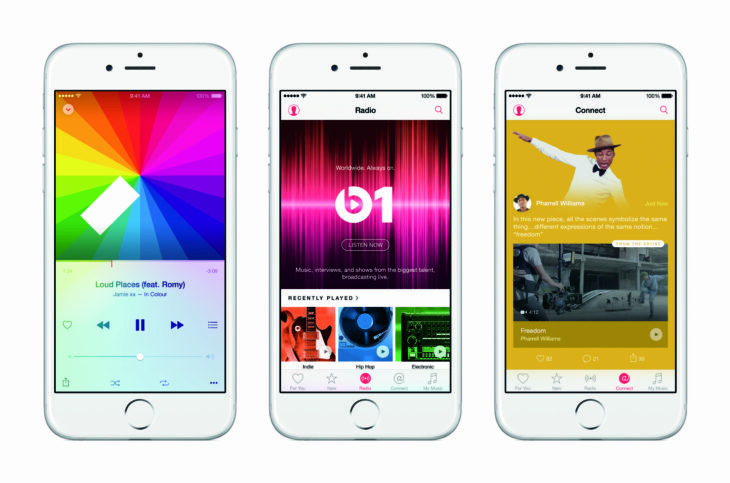[bsa_pro_ad_space id=1]
Into Tomorrow with Dave Graveline listener Karl in Rapid City, South Dakota asked us an interesting question about streaming services:
With the Apple Streaming service starting at the end of the month, it’s high time you have a segment about whether your listeners would be better served by renting (which is crazy) or owning their music.
As you know, downloads have been decreasing in favor of streaming services. I personally favor owning mine. If I want to listen to or discover new music, I listen to free pandora. If I hear an interesting song on Pandora, instead of listening forever for the song to repeat, i go to free Spotify and record the song into iTunes and listen for a period of time. If I like the song, I go to the iTunes store and buy it.
The bulk of my music is based on previously owned vinyl and CDs. By not spending $10 a month, I’ve got a budget for about 100 songs a year. In the years iTunes has been around, I’ve never bought 100 songs in a year. What are people renting for? Can you give me some insight into that? Also – if you have a Spotify account, does it allow you to listen on a mobile device when you are away from wi-fi and mobile data services?
Karl, the first thing you should know is that if you download your music from any digital service, you don’t own it the same way you own the music on a CD.
iTunes in particular is pretty soft on their terms, but others like Amazon are much harsher. Amazon even says “You do not acquire any ownership rights in the Software or Digital Content as a result of downloading,” iTunes uses softer language, but basically means the same thing, and all companies reserve the right to change the license at any time without consulting or notifying you.
The first-sale doctrine (basically: “if you bought a CD you can sell it”) does not apply to you, so if you spend $1000 on digital downloads and feel like selling them since you’re moving to a sailboat that is permanently anchored 200 miles from the nearest source of electricity, that’s too bad… you bought the license, not the content and you can’t sell it.
So, if you want to own and not rent your music, you probably want to buy CDs, cassettes, vinyl, 8-track tapes, sheet music, or anything else physical.
Who is Apple really selling to, though?
Now, Apple’s $10/month service is probably not geared towards you… it may not even be geared towards people that like music very much, it’s probably aimed at people who like hits and have disposable income.
If you truly like an album you can buy it, if you truly like individual tracks you can buy them, if you just have the latest disposable pop song stuck in your head, you probably don’t need to buy it, it most likely has a shelf life that makes a fruit fly feel good about itself, but with Apple Music you can listen to it, and that Bee Gees that was playing at the grocery store, and that Sinatra song that your neighbor was humming last time you saw him, and that Slipknot song you liked on that summer you decided black clothes were cool, and that Justin Beiber song you only listen to with your headphones on and with the volume set to 2, and those are all little bonuses people get used to.
Could you just play them off of YouTube? Yup.. but hey, if you want an easy, low bandwidth way to play them and $10/month doesn’t put a dent in your bank account balance, then you can use the service.
About your Spotify question, it works the same way as Apple Music and Amazon Prime Music when it comes to offline access, you can download and play songs offline on either, but you have to be an active paid subscriber, otherwise the songs won’t play offline. If you want to play specific tracks on a mobile device at all, Spotify also asks for a monthly subscription, even if you can listen on a computer without one.
And before we forget, let’s note that even if you bought physical media like CDs and then resold them, legally at that point you would have to destroy any electronic copies you’d made of those songs.
So why do we like streaming services?
The reason that we like and use streaming services such as Apple Music is their vast catalog of songs. When friends come over for dinner and you’re playing music on your sound system, it’s nice to be able to play some music you know they will like without having to purchase that music yourself – especially when you know that you don’t like it and won’t listen to it again.
Both models, renting music and buying music, have their place. Listening to free Pandora or Spotify is fine also, because they share their ad revenue with the artists (even though Taylor Swift doesn’t like the percentages). As long as you’re not downloading illegal copies of copyright music, we say “go for it!”
By the way, in our early reviewing of Apple Music, comparing it to Spotify, we find the Spotify interface to be better, the Apple Music catalog to be larger (and therefore better), and the sound quality to be approximately the same. We’ll keep using them both and have more to say, long-term.


